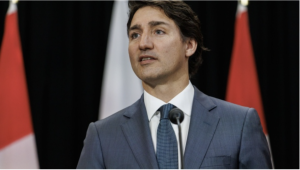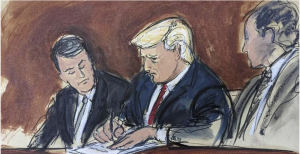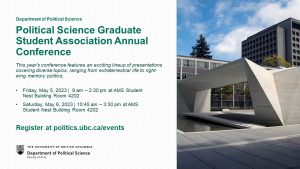Voters should look out for urgency, specifics and honesty when evaluating a political candidate’s stance on climate change, says Prof. Harrison
Voting is one of the most effective forms of climate action, but Prof. Harrison says that when evaluating a candidate’s bid for your vote there are three main things to look for.
There are two major political barriers to reach Trudeau’s pledges to cut emissions and reach net zero, says Prof. Kathryn Harrison
There are two major political barriers to reach Justin Trudeau’s pledges to cut emissions by 40% to 45% below 2005 levels by the end of the decade and reach net zero by 2050. Prof. Harrison said she doesn’t see how the targets can plausibly be achieved without a cap on oil and gas production and Trudeau’s carbon price.
The charges brought against Trump are a lot more serious than the first case brought against him, says Prof. Quirk
In an interview with CBC Kids News, Quirk emphasized the critical nature of the disclosed documents, describing them as containing some of the United States’ most vital secrets. He highlighted the potential jeopardy to American safety if classified information, such as details concerning nuclear weapons, were to be compromised.
Watch: UBC Political Science Graduate Student Association hosted its 2023 Annual Conference
This year’s Graduate Student conference featured an exciting lineup of presentations covering diverse topics, ranging from extraterrestrial life to right-wing memory politics. The keynote address was delivered by UBC Political Science Professor Nazmul Sultan and titled, Gandhi and Empire: A Reconsideration.
UBC Political Science Student Mathew Ho wins Schuman essay writing challenge
As a winner of the Schuman Challenge, Mathew Ho will be invited for a one-week visit to Brussels in September where he will be introduced to all key institutions of the EU.
Teaching Democracy with Profs. Maxwell Cameron and Afsoun Afsahi
In this new Faculty Conversation Series, UBC Political Science Profs. Maxwell Cameron and Afsoun Afsahi talk about their research exploring solutions for how people who have conflicting political and moral opinions can talk about political issues. Their conversation explores how UBC Political Science and the Centre for the Study of Democratic Institutions teaches our students to become democratically-thinking in their aspirations.
UBC Political Science students learn from European Union travel experiences
Under the leadership of Professor Kurt Huebner, UBC Political Science offers a range of educational opportunities for students to explore European politics with opportunities to learn both in Europe and across North America.
Congratulations to our 2023 Graduates!
Congratulations to the Class of 2023! We celebrate the accomplishments of our graduates and wish them the very best in their future endeavours.
Prof. Maxwell Cameron examines the challenge of electoral denialism in American politics
Recent political crises in Peru, Brazil, and the United States have exposed a new threat to democracy: electoral denialism, or misleading claims about fraud intended to prevent normal alteration in public office between government and opposition. Electoral denialism weakens the core electoral components of democracy by encouraging a substantial part of the electorate to distrust elections as a mechanism for conflict resolution.
The Parliamentary Budget Officer report on Clean Fuel Regulations raises important questions on the impacts of reducing emissions on lower income families, says Prof. Kathryn Harrison
The Parliamentary Budget Officer’s report, released May 18, found the Clean Fuel Regulations (CFR) were “broadly regressive” and would occupy a larger share of the disposable incomes of lower income Canadians, as compared with higher income earners. Prof. Kathryn Harrison says “the reality is that reducing Canada’s greenhouse gas emissions is not going to be free. It’s going to cost money.”









